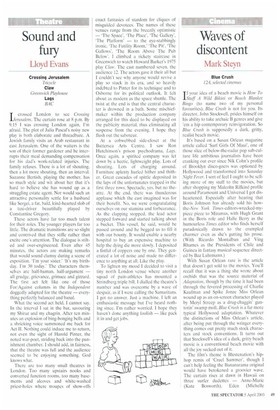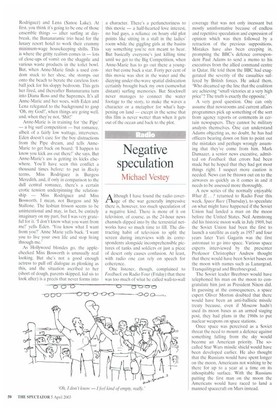Waves of discontent
Mark Steyn
Blue Crush 12A, selected cinemas
Ifyour idea of a beach movie is How To Stuff A Wild Bikini or Beach Blanket Bingo (to name two of my personal favourites), Blue Crush is not for you. Its director, John Stockwell, prides himself on his ability to take archaic B genres and give 'em a hip contemporary reinvigoration. So Blue Crush is supposedly a dark, gritty, realist beach movie.
It's based on a Susan Orlean magazine article called 'Surf Girls Of Maui', one of those slice of below-the-radar pop sub-culture life ambitious journalists have been cranking out ever since Nik Cohn's profile of Brooklyn disco-goers was optioned by Hollywood and transformed into Saturday Night Fever. I sort of feel I ought to be selling more of my stuff to the movies, but after shopping my Malcolm Rifkind profile around Paramount and Universal I got disheartened. Especially after hearing that Boris Johnson has already sold his howthe-New York Times-editors-wrecked-mypiece piece to Miramax, with Hugh Grant in the Boris role and Halle Berry as the humourless Times editor who finds herself paradoxically drawn to the crumpled charmer even as she's gutting his prose. (With Ricardo Montalban and Ving Rhames as the Presidents of Chile and Guinea in fantasy musical sequence directed by Baz Luhrmarm.)
With Susan Orlean rare is the article that doesn't get sold to the movies. You'll recall that it was a thing she wrote about orchids that was the source material of Adaptation, though by the time it had been through the fevered processing of Charlie Kaufman and Spike Jonze Miss Orlean wound up as an on-screen character played by Meryl Streep as a drug-chuggin' guntotin' swamp moll. Blue Crush is a far more typical Hollywood adaptation. Whatever the distinctions of Miss Orleans article, after being put through the wringer everything comes out pretty much stock characters and stock conventions. It turns out that Stockwell's idea of a dark, gritty beach movie is a conventional beach movie with all the joy sucked out of it.
The film's theme is Blestenation's hiphop rernix of 'Cruel Summer', though I can't help feeling the Barianarama original would have betokened a groovier wave. The curtain rises at dawn in Hawaii on three surfer dudettes — Anne-Marie (Kate Bosworth), Eden (Michelle Rodriguez) and Lena (Sanoe Lake). At first, you think it's going to be one of those ensemble things — after surfing at daybreak, the Bananaramic trio head for the luxury resort hotel to work their crummy minimum-wage housekeeping shifts. This is where the gritty realism comes in — lots of close-ups of vomit on the shagpile and various waste products in the toilet bowl. But, when Anne-Marie finds a used condom stuck to her shoe, she stomps out onto the beach to berate the careless football jock for his sloppy bedroom. This gets her fired, and thereafter Bananarama turn into Diana Ross and the Supremes. It's all Anne-Marie and her woes, with Eden and Lena relegated to the background to gasp 'Oh, my God!', when things are going well, and, when they're not, 'Shit!'
Anne-Marie is in training for 'the Pipe' —a big surf competition — but romance, albeit of a fairly low wattage, intervenes. Eden doesn't care for the boy distractions from the Pipe dream, and tells AnneMarie to get back on board: 'I happen to know you kick ass out there!' she says. But Anne-Marie's ass is getting its kicks elsewhere. You'll have seen this conflict a thousand times before: to put in Rocky terms, Miss Rodriguez is Burgess Meredith, and, if only in comparison to the dull central romance, there's a certain erotic tension underpinning the relationship — Miss Rodriguez and Miss Bosworth, I mean, not Burgess and Sly Stallone. The lesbian frisson seems to be unintentional and may, in fact, be entirely imaginary on my part, but I was very grateful for it. 'I don't know what you want from me!' yells Eden. 'You know what I want from you?' Anne Marie yells back. 'I want you to live your own life and stop living through me.'
As Hollywood blondes go, the applechecked Miss Bosworth is unusually real looking. But she's not a good enough actress to pull off dialogue as plonking as this, and the situation ascribed to her (short of dough, parents skipped, kid sis to look after) is a precis that never forms into
a character. There's a perfunctoriness to this movie — a half-hearted love interest, no bad guys, a reliance on hoary old plot points like sitting in a stall in the ladies' room while the giggling girls at the basins say something you're not meant to hear. But basically everyone's just killing time until we get to the Big Competition, when Anne-Marie has to go out there a youngster but come back a star. Forty per cent of this movie was shot in the water and the dizzying under-the-wave spatial dislocation certainly brought back my own (somewhat distant) surfing memories. But Stockwell never manages to connect the water footage to the story, to make the waves a character or a metaphor for what's happening on land — except in the sense that this film is never wetter than when it gets out of the ocean and back to the plot.



































































 Previous page
Previous page